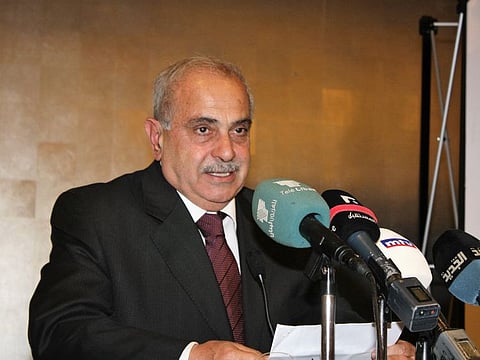Lebanon expert: Enhance public revenue, decrease public expenditures
There have been widespread protests against ‘corrupt elite’, economic mismanagement

Beirut: A leading Lebanese economist has said that the country’s GDP could decrease by a whopping 10-15 per cent in 2020 if things continue the way they currently are in Lebanon. Since October 17, Lebanon has been witnessing nationwide protests against the old ruling elite, political corruption, deteriorating financial situation, zero economic growth, and high unemployment.
Nearly 1.5 million protesters took to the streets, calling for the resignation of Sa’ad Hariri, who stepped down as prime minister on October 29. Hariri headed a caretaker cabinet until February 11 when PM Hassan Diab’s Hezbollah-backed cabinet won a vote of confidence during a controversial parliamentary session that witnessed violent street protests.
Discussing the graveness of the economic situation and its exhausting consequences on the society, Dr Kamal Hamdan, the Managing Director of the Consultation and Research Institute (CRI) in Beirut, said that he sees the crisis is a multi-pronged one. Hamdan told Gulf News: “It is an economic crisis with decreasing growth rate, where in 2018 Lebanon was at minus 2 per cent and in 2019 that percentage went higher. In 2020, we expect a 10-15 per cent decrease in GDP if everything continues to be the same. This is a very serious economic and financial crisis, with a deficit in the budget that goes beyond 10 per cent … a record for Lebanon. The deficit ratio in 2020 may increase to 15 per cent of the GDP because the GDP is decreasing while public expenditures are maintaining their previous levels.”
Strong dollar
A well-known economist and analyst, Dr Hamdan said that Lebanon has had a decrease in the exchange rate of the Lebanese pound for the first time since 1992. “The dollar has increased by 65 per cent against the local currency within four months. It is a banking crisis as well, where most banks are hit by big challenges. They may lose their capital because of the decrease in treasury bills in the US dollars and the fact that around $70 billion that the banks put in the Central Bank are no more there. The latter has only [as per its last budget] $30-32 billion in foreign currency while the deposits of the banks go beyond $70 billion,” he said.
Lebanon has one of the highest public debt ratios in the world and is going through its worst economic situations since the Civil War ended in 1990.
Gulf support
Dr Hamdan also believes there is a social crisis, as the strengthening of the dollar has led to an increase in cost of living. Consequently, the purchasing power of 70 per cent of Lebanese has decreased since wages and pensions are worth less now.
In response to a question about whether he thinks PM Diab’s efforts will convince GCC states to help Lebanon recover from its financial crisis amid regional political conflicts and tensions with Iran, Hamdan said the Gulf countries should provide support to Lebanon because of the historical relations with the GCC.
“The relationship between Lebanon and Gulf states has more than just an economic dimension. It has a political one. It will help Lebanon in maintaining the equilibrium between the different regional stakeholders.”
Given all these destabilising crises; economic, financial monetary, banking and social the situation could be labelled as ‘catastrophic’, he said.
Three priorities
When asked if Lebanon can come out of these difficulties, or is its collapse inevitable, Hamdan said definitely the country is in a very bad situation but there are three priorities.
“One is to urge the public authorities and specifically the Central Bank to determine the financial gap concerning its relation with banks and the Finance Ministry. This hole is not very well defined at present … some experts are raising the figure of $20 billion in losses and others are stating $40 billion, meanwhile some others are stating that the hole [gap] is mounting at $80 billion. For this task, the government is requested to determine exactly the magnitude of the gap.
“Priority two is to translate all the items included in the ministerial declaration into actions and measures. Also try to quantify their impact on decreasing the size of this hole either by enhancing public revenue or decreasing public expenditures in such a way as to arrive to a better situation in the public finance.
“Now, here when we speak about revenues and expenditures there are many topics to raise, such as restructuring the fiscal policy and to introducing progressivity on taxes. When it comes to the public expenditure we need a very profound reallocation of resources in to the public sector and restructuring of the public expenditures. For instance the problem of the oil subsidy which is costing the government $2 billion yearly … we have to solve all these issues. We have to consecrate the independence of the judicial body. We have to produce the decrees pertaining to the public money that has been stolen during the crisis and massive amounts of capitals that have been transferred outside the country by the big businessmen and politicians,” said Hamdan.
Sign up for the Daily Briefing
Get the latest news and updates straight to your inbox








